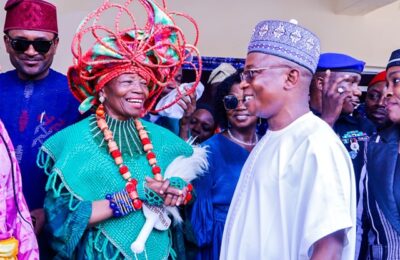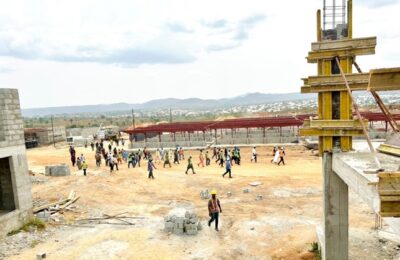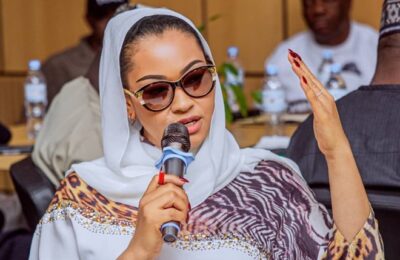By Taiye Bayode.
Hon. Muhammed Muktar Shuaibu, Commissioner for Commerce and Industry, has reaffirmed the commitment of Governor Ahmed Usman Ododo, to building long-lasting, mutually beneficial partnerships that enhance business growth, industrialization, and economic inclusion across Kogi state.
Represented by Mr. Oluwatimilehin Anthony Joash, the Commissioner made this assertion during day 2 of the Sustainability Commemoration Week organized by Dangote Cement Transport, held at the Dangote Cement Drivers’ Training School, Obajana.
The event, themed “Sustainable Partnership: A Catalyst for Business Growth,” brought together industry stakeholders, educationists, business leaders, and community representatives to discuss ways of promoting enduring partnerships for social and economic development.
In his guest lecture, the Commissioner explained that the topic directly aligns with the core functions of the Ministry, which oversees commercial and industrial activities within the state, noting that the Government’s focus is to always create a business environment that allows both small and large enterprises to thrive through collaboration and innovation.
Hon. Shuaibu stated that in today’s highly competitive and dynamic economy, no organization can succeed in isolation, adding that the business world is so competitive that if you attempt to do it alone, you may not achieve your desired success, as collaboration is the key to driving sustainability and progress.
Defining partnership as a collaborative relationship between two or more parties for mutual benefit, the Commissioner stressed that a partnership must be anchored on agreement, understanding, and fairness. “Partnership cannot be parasitic; both parties must agree on what to contribute and what to gain.
When a partnership benefits only one side, it cannot last or yield growth.” he said.
He identified three major pillars upon which sustainable partnerships are built: economic viability, social responsibility, and environmental consciousness, explaining that: Economic viability ensures that every partner contributes meaningfully and has the capacity to sustain the relationship; Social responsibility focuses on aligning partnerships with community needs, ensuring mutual value creation and environmental consciousness ensures that businesses operate in environments suitable for their type of venture, as every enterprise must understand the dynamics of its operating space.
Explaining further, he emphasized that sustainable partnerships go beyond short-term transactions and should be based on trust, transparency, accountability, and shared goals, warning that any partnership lacking these elements is bound to fail.
Using local examples, Hon. Shuaibu illustrated how cashew farmers could pool their resources together to meet export tonnage requirements, showing that such collaborations not only create opportunities for profitability but also reduce risks and promote market expansion.
He also mentioned other forms of sustainable partnerships, including Public-Private Partnerships (PPP) between government and businesses, Business-to-Business (B2B) alliances, Business-Community Partnerships, and International Collaborations that facilitate technology transfer and export opportunities.
Speaking further, Hon. Shuaibu emphasized that government institutions play a vital role in encouraging sustainable partnerships through supportive policies, access to finance, and infrastructure.
Referencing the State Action on Business Enabling Reforms (SABER) initiative, which domesticated the federal Presidential Enabling Business Environment Council (PEBEC) framework to improve the ease of doing business in Kogi, adding that such reforms have contributed to the resolution of business challenges, including the tariff disputes between telecommunication companies and the state.
During the interactive session, participants raised important questions concerning youth empowerment, skill acquisition, and the need to integrate entrepreneurship education in school curricula.
In response, the Commissioner emphasized the importance of early exposure to skills, urging parents to encourage their children to learn trades during holidays rather than focusing solely on academic lessons.
He also assured participants that suggestions from the event would be communicated to the related Ministries/agencies for further action.
A representative from Dangote’s Sustainability Team explained ongoing initiatives aimed at empowering host communities through vocational training and employment, citing examples of past community trainees who were trained in welding, mechanical works, and electrical maintenance respectively.
The event also featured award presentations by Taiye Bayode to schools in host communities, including Golden Vessel Academy, Best Elite Standard International School, and Excellent Future Leaders International Academy who emerged overall winner of the quiz competition.
In closing, the Commissioner reaffirmed that the Ododo led administration will continue to promote policies that encourage industrial expansion, entrepreneurship, and partnerships that deliver lasting impact for the good people of Kogi State.




